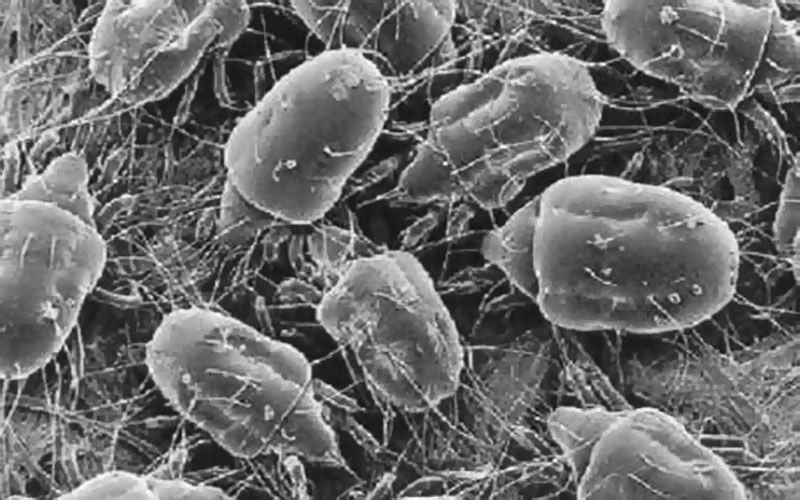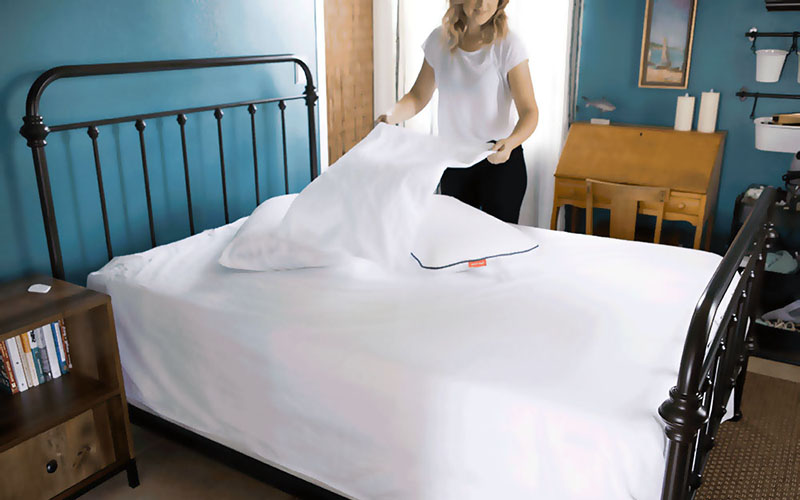
If you’re in the hospitality business you wash the sheets every day after someone sleeps on them. Travelers understandably expect nothing less from the hotel where they’re staying. They want and expect to see pristine, sweet smelling sheets when they peel back the blanket and they won’t stay in any hotel that doesn’t make daily linen service part of their routine.
But do those travelers apply the same standard at home? Should they? If so, why so? And if not, why not? That’s what we’re here to find out.
The Case For Frequent Washing
The case for washing your bed sheets as often as possible is a strong one and begins by taking a look at all the things that collect on your sheets while you sleep, (and after you rise). The sleepy-time stew begins with dead skin cells.
Whether you know it or not you’re a dead skin cell factory. The average person sheds up to 1 million skin cells every day (1). A good percentage of them while sleeping. The longer you wait to wash the sheets the more dead skin cells you’re settling down into. (Dead skin cells are also a favorite food of dust mites, which we’ll get into in a few moments.)
Then there is all the sweat you leave behind on the sheets. Unless you keep the AC running all the time you’re going to sweat onto your sheets quite a bit. That moisture doesn’t just evaporate instantly, a lot of it lingers on the sheets inviting bacteria to stop by for a snack. It also mixes with the dead skin cells to create an unholy goo that hardens a bit during the day, then loosens up when warmed by your body heat at night.
Let’s not forget that oils from your sebaceous gland (2) also wind up on the sheets, along with dirt from your body if you don’t shower every day (and research indicates that nearly 3/4 of men skip the daily shower on a pretty regular basis). In addition, those who sleep naked are likely to add a wee bit of urine to the brew as well as tiny bits of fecal matter.
Turning to the pillow case, it not only accumulates oil, sweat and dust mites, but also plays the role of drool (3) receptacle. If you sleep with someone else, you can magnify all of the above by 2. So when you think of it that way, maybe the hotels are on to something. But there’s more.
Say Hello to Your Little Friends
Before we go any further it’s time to talk about dust mites (4). Dust mites are everywhere. There’s no way to completely escape them. They exist by the trillions and can be found pretty much everywhere humans are because their favorite source of food is dead skin cells. But while there is no way to completely eradicate these microscope critters, it is possible to purge your bed of the vast majority of them by washing the sheets and pillow cases regularly.

Dust mites are too small to see with the naked eye, but just because you can’t see them doesn’t mean they aren’t there. And the longer you wait between washing your sheets the more of them you’ll be sleeping on every time you lay down. But you won’t just be sleeping on live dust mites, you’ll also be sleeping on untold numbers of dead ones and, worst of all, their fecal matter. Fortunately, they don’t bite. But that’s about their only redeeming quality.
The Real-World Health Implications
All that dust mite doo-doo and all those dust mite carcasses produce a significant allergic threat (5). In fact, if you wake up sniffling in the morning it may well be because you’ve been inhaling dust mite detritus all night. Also, if you suffer from asthma, hay fever or bronchitis dust mites will often make those conditions worse.
In addition, failing to wash your sheets on a regular basis can create a situation where bacteria feasting on the sweat/dead skin cell/body oil stew can multiply to such a degree that they actually disrupt your skin’s microbiome (6). This can lead to inflammatory skin conditions such as eczema, dermatitis or acne.
So How Often Should You Wash Your Sheets?
As is the case with most things in life the answer is… it depends. Given all that we discussed above it would be perfectly reasonable to take your lead from the hospitality industry and wash your sheets every day. Or have several sets of sheets available and rotate a clean set onto the bed every day.
Thing is, most people have neither the time nor the inclination to do so. For the less fastidious among us (i.e. most people), a weekly scrubbing of the sheets and pillow cases is recommended. If you are so pressed for time that a weekly sudsing is a non-starter then you should wait no more than 2 weeks to wash your bedding. That’s it. If you think you won’t have time to do that, then you should either get a different job or hire a maid.
There are also certain instances when you should not wait more than a week under any circumstances. Such as…
- If you suffer from seasonal allergies.
- If you suffer from asthma, chronic bronchitis or other respiratory conditions.
- If you find yourself sniffling or itching when you lie in bed.
- If you or your bedmate experience night sweats (7).
- If you or your bedmate have recently had a cold or the flu.
- If you allow your pet to sleep with you.
If you’re not used to doing it, washing the sheets once a week can seem like a major inconvenience, but in most cases it’s just a matter of building a new habit. Once you get used to sleeping on clean bed sheets you won’t ever want to go back to the gruesome petri dish you used to lay on.
Don’t Forget the Comforter or Duvet
Duvets and comforters are often confused with one another, but there’s a subtle difference between the two. A duvet is designed to be shoved inside a removable cover. A comforter is a single, indivisible thing.
Now that we have that out of the way, you should wash your comforter once every season. The same goes for the duvet cover. The fluffy inside portion of the duvet should be washed twice a year. This is, of course, assuming that you do not sleep on top of either one, or pull them over your body without a sheet between you and them. If you regularly sleep with your skin in direct contact with either you should wash the comforter or the duvet cover every couple of weeks.
Remember Not to Make Your Bed
At least, not as soon as you get up. If you are going to wait a week or two between washings then you should do what you can to make your sheets as unfriendly as possible to bacteria and dust mites. If you make your bed as soon as you get up it will trap moisture and heat, which in turn will promote bacterial growth, attract dust mites and encourage the ones that are already there to multiply faster (8). So let the bed air out before making it.

Wash The Sheets Immediately After an Illness
If you or someone else in the house has been sick make sure you wash the sheets as soon as they are able to get out of bed. Viruses, bacteria and germs are surprisingly hardy and can live on bed sheets for up to several hours.
Not only that, but if the person has spent days in bed sweating with a fever the sheets are now saturated with that sweat, body oils, other bodily excretions, 10s of millions of dead skin cells and other detritus. So change the sheets as soon as the sick person is able to get up and throw the dirty sheets into the laundry pronto.
What is the Best Way to Wash Bedding?
You spend more time in your bed sheets than you do in any single article of clothing. That is, you change your underwear, shirts, blouses, pants, dresses, shorts and other items regularly. But you get into the same bed sheets night after night for hours at a time. So it’s important to clean them properly to remove all the aforementioned detritus.
As a general rule, unless the sheets are stained there is no need to engage in pre-treating them before tossing them in the washing machine. Pillow cases, however, are often a different story. Because most people drool at least a little bit during the night, pillow cases often have stains bed sheets won’t. So you may have to pre-treat them.
If yours is a fairly new washing machine it may have a setting for bed sheets. If it doesn’t, not to worry, just use the ‘normal’ cycle because sheets won’t typically need any degree of heavy duty agitation. What your sheets will need, to ensure you rid them of dust mites, bacteria and other nasties, is hot water.
You should in fact crank up the water temperature to the highest setting the sheets will allow. It should state what that is on the care label. If you have sheets that are hypersensitive to water temperatures you should consider replacing them with ones you can wash in hot water. Because that’s the best way to kill off viruses, bacteria, dust mites and more.
If time allows you should also consider ironing your sheets. This will put the final nail in the coffin of any microbes that survived the wash cycle. Once the sheets are clean, ironed and folded, store them in a cool dry place until they’re needed.
Washing Other Items
As we mentioned earlier other items such as comforters and duvets don’t need to be washed all that often, as long as they don’t come into direct contact with your skin while you sleep. However, if you regularly sleep in the nude, in direct contact with either the duvet or comforter, then they should be cleaned every couple of weeks to prevent them from becoming warm, comfy bacterial mats.
Even if you do not make direct contact with the duvet or comforter, dust mites will still find their way onto them. So you might want to consider tossing them in the dryer for 10 or 15 minutes once or twice a month. The excessive heat will kill off those pesky critters.
As for pillows, the cases should be washed every week, or every two weeks at the most. The pillows themselves should be washed two or three times per year, if the material will allow it. If your pillows cannot be washed you should consider replacing them with pillows that can be.

Common Sheet Washing Mistakes
Washing the sheets is not rocket science, but there are a few mistakes people routinely make nonetheless. They are:
Washing the sheets in cool water – People will often choose a ‘normal’ cycle to wash their sheets (which is fine), but they’ll neglect to increase the water temperature. It’s important to wash the sheets in the hottest water the sheets will allow. This is the best way to ensure they emerge from the wash microbe-free. Washing them in cool water may allow countless tiny critters to return to the bed with you.
Putting too many things in with the sheets – Overloading the washer is not a great idea if you want to make sure the sheets emerge in a hygienic state. Stuffing the machine, even if you’re stuffing it with other sheets, will make it less likely the sheets emerge truly clean. Try to keep the load to a modest size, washing just a couple of sheet sets at any one time.
Drying the sheets on low heat – We understand that in some cases you don’t have a choice. If you dry the bed sheets on anything but cool, they’ll shrink to the size of a doily and be unusable. But if the sheets allow you to up the heat a bit, do it. This will kill off any microbes or critters that survived the wash.
Hanging the sheets out to dry – As tempting as it might be to hang your sheets outdoors on a fine summer day, doing so could just result in trading one type of allergen for another. Sure, you’ll kill most or all of the dust mites and bacteria by washing the sheets in hot water. But when you hang them on the line outside they’ll just collect pollen and mold spores (9) and you’ll bring those back into the house – and into your bed – with the sheets.
FAQs
Do I need to wash the mattress protector too? – If you have one you certainly should. While you won’t have to wash it as often as you wash the sheets, remember that the sheets come into direct contact with it, so there will be some migration of dust mites and bacteria to the mattress pad. Also, if someone who uses the bed experiences night sweats that will likely soak through to the mattress protector and promote bacterial growth. It’s recommended then that you wash the mattress pad/protector every month or two.
How often should I change my sheets? – There is a distinction between washing your sheets and changing your sheets. A person may wash their sheets every week and put them right back on the bed. Or they may have several pairs of sheets and rotate them out. That is, they remove the dirty sheets and toss them in the wash, and then take clean sheets from the linen closet and put them on the bed while the dirty sheets are washing. The bottom line: if you have multiple sets of bed sheets rotate them every time wash day rolls around.
Why do the sheets feel so good when they’re clean? – Mostly because there is such a difference between the dirty and the clean sheets. If you changed the sheets on your bed every day the agreeable sensation of sliding in between clean sheets would not be so noticeable. You would come to take it for granted after a while. Whereas if you haven’t cleaned your sheets in two weeks there is going to be a big difference when you finally slip into sheets that are clean.
Conclusion
It’s understandable when people don’t have time to wash their sheets every day. In many cases it’s not really necessary anyway. But once you reach the 1 week threshold you’re entering a danger zone where microscopic organisms like dust mites along with bacteria, mold and other allergens begin accumulating at an alarming rate.
If you need some inspiration to carve out time to wash the sheets every week or two just remember that you wouldn’t wear the same underwear every day for a week or two without cleaning it (at least we hope you wouldn’t). Bed sheets spend almost as much time up against your bare skin as your underwear does and, if you sleep naked, they’re exposed to the same areas.
So do yourself a favor and get in the habit of washing your sheets on a regular basis. Every week preferably, but every two weeks if it’s the best you can do.
Recent Posts
Everyone has trouble sleeping now and then. But some have more trouble than others. If you have been experiencing trouble falling or staying asleep it may be due to a health condition such as sleep...
When most people hear the word “hygiene” they think of things like making sure the bathroom is clean, washing your hands often, using disinfectants on frequently touched surfaces and even...